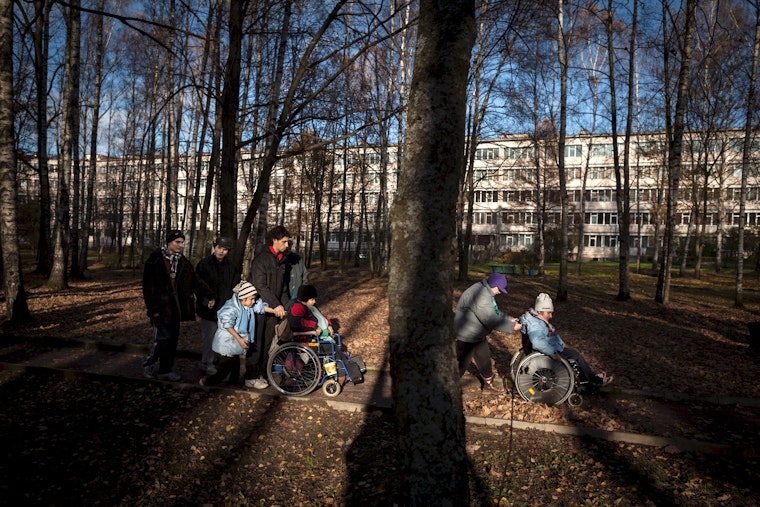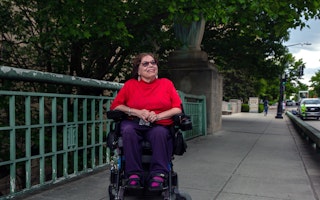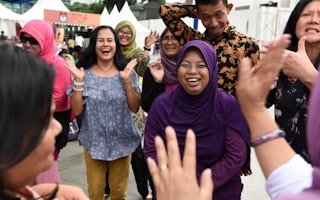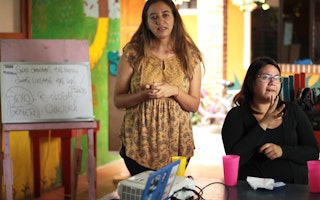People with Disabilities in Russia, Once Invisible, Find Their Voice
By Denise Roza

When I first came to Moscow from the United States in 1984, I hardly ever saw a physically disabled person on the streets. The reason was simple: without accessibility, there was no way to get around the city in a wheelchair.
I don’t think many people even had access to wheelchairs, and the ones that did had wheelchairs that were “for home use only.” Because of this, people with physical disabilities were very isolated and had few opportunities.
Fast-forward five years. The Soviet Union was collapsing, and all people could talk about was change. I remember going to rallies and hearing discussions of equal opportunities and rights—it was thrilling. It was amid this atmosphere of possibility and optimism that people with disabilities started to demand change as well.
In the early ’90s in Moscow, a national disability organization, together with the city government, provided material support to people with disabilities—enough to help them to survive. But people knew almost nothing about disability rights advocacy and the independent living movement.
Together with some of my disabled Russian colleagues, I helped set up Perspektiva in 1997 to promote a shift in the way people with disabilities were perceived in Moscow and throughout Russia. Our goal was to give people with disabilities the opportunity to speak out about their rights, to realize their human potential, and to understand that they were not to blame for their lack of success or lack of opportunities—it was the fault of the physical barriers and negative attitudes around them.
Creating employment and educational opportunities was an early focus of Perspektiva. The philosophy of independent living for people with disabilities was totally new in Russia, and employment and inclusive education were the best ways to make this idea a reality. We held trainings for people with disabilities in which we talked about barriers and how to break them down, and how people with disabilities can live independently, be proud of themselves, and help others to believe in themselves.
I remember that people—even disabled people themselves—were shocked to meet trainers with disabilities. For them, it was a completely new way of looking at the world.
We looked at issues that young people with disabilities faced, which was a neglected area of focus, because most of the disability organizations—organized by people with physical disabilities—had traditionally been run by war veterans. With Open Society’s support, we provided empowerment trainings for youth, focusing on independent living philosophy and teaching them about the social model of disability and about promoting human rights instead of charity.
The right to education also became a focus for Perspektiva. Kids with disabilities, whether having significant mobility impairments or intellectual disabilities, had always been enrolled in home schooling programs or in residential institutions—many of those children received no education.
At that time, inclusive education was practically nonexistent and we used to hear all the time: “Kids with disabilities are uneducable.” Perspektiva’s small team started started by bringing people with disabilities into mainstream schools to hold disability awareness trainings, and to participate in activities to educate and engage the parents of disabled children. We assured them that their children could have a bright future if they could be out of the home and among their peers.
We were one of the first NGOs in Russia to start promoting inclusive education and to get disabled children and their parents involved in meetings and decision-making processes around inclusive education. My disabled colleagues served as positive role models and changed the attitudes of teachers and parents who had never met a person with a disability.
Attitudes have shifted even further since then, in particular since 2012 when Russia ratified the UN Convention on the Rights of Persons with Disabilities (UNCRPD). Legislation has been changing every year to correspond with the UNCRPD.
Ten years ago, the impression was that accessibility requirements were simply a box to check, and were implemented without the involvement of people with disabilities. Today, we can see that people with disabilities are much more involved in decision making.
We now see more government support, including improvements in building and transportation accessibility. The Paralympic Games in 2012, which secured a lot of positive media coverage, also helped to change attitudes towards people with disabilities. But there is still much to be done—for example, many ramps still need to be brought into line with international standards.
For the most part, people with disabilities are no longer as hidden in Russia. They have become more visible, face less stigma, get a better education, go to public events, speak out on social media, and are generally becoming active participants in society. But we are still fighting negative attitudes, myths, and a lack of sufficient services.
I hope that in the next 20 years we will see a new generation of people who are even more open and committed to upholding the rights of people with disabilities.
Denise Roza is an American who has lived in Russia since 1989. She runs two disability organizations—Best Buddies Russia and Perspektiva, a former grantee of the Open Society Foundations.
Denise Roza is founder and director of the disability rights organization Perspektiva.


